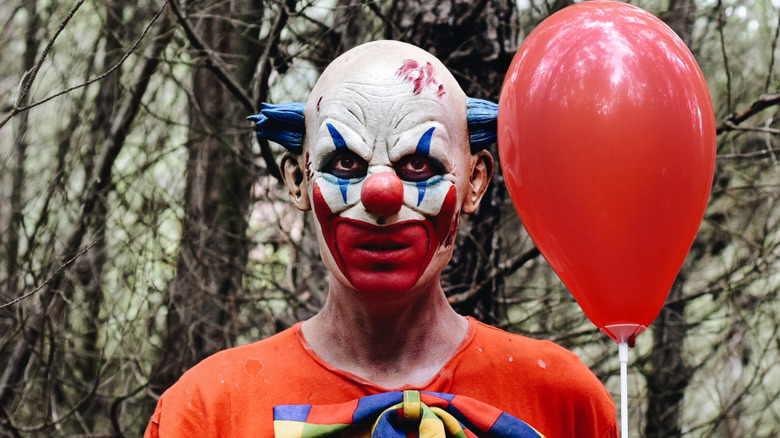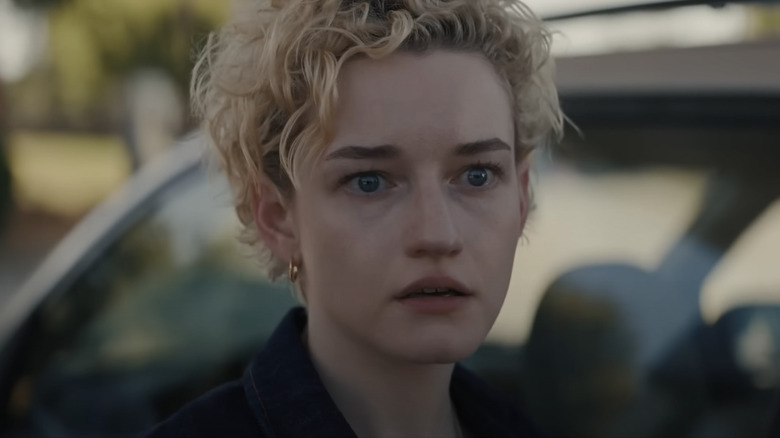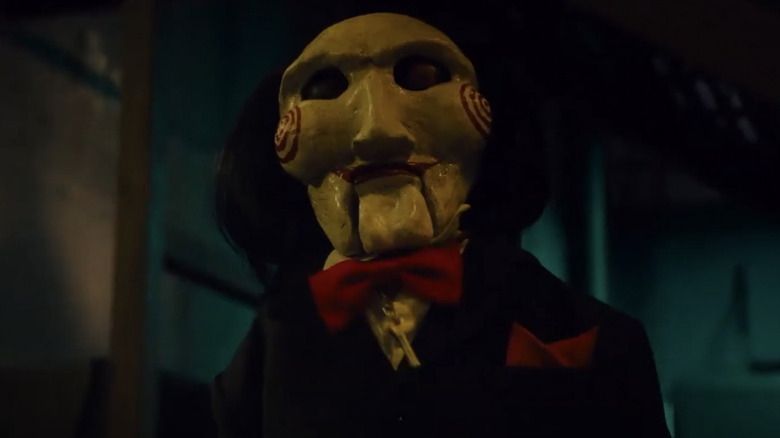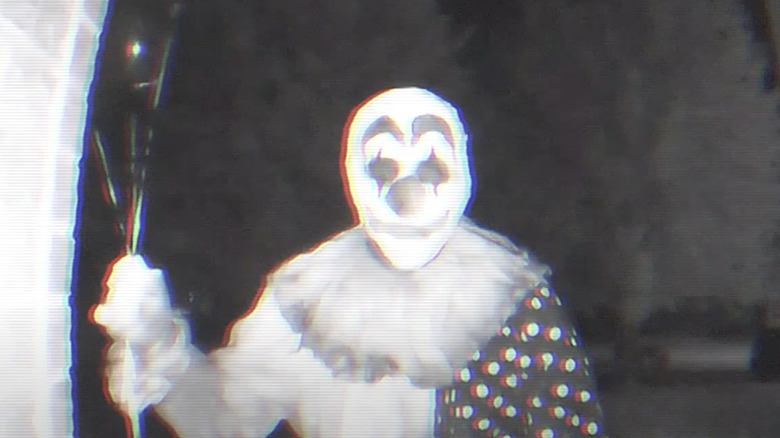The Creepiest Real-Life Hoaxes Inspired By Horror Movies
When it comes to movies, horrors are in a class of their own. Built on surprise, novelty, and invoking some combination of fear, disgust, and ironic delight, horror movies, and the ones that redefine the genre in particular, are the most reactive and visceral of entertainments. But there are so many released each year that studios and marketing teams face the daunting task of trying to differentiate their films from all the others, and they'll do almost anything to attract large audiences to their work.
Horror movies are tough to market because the grisliest elements can't be widely displayed or broadcast, and nobody involved wants to give away the inevitable plot twists and shocking reveals. A publicity stunt that makes the general public feel horror movie emotions like fear and unease, for real, is often the solution. Then, completing the circle, those same reality-based scare tactics are utilized by hoaxers and pranksters to call attention to an issue — or just spread a small amount of terror, just like movie marketers. Here are some news stories that at first looked like terrifying true events but turned out to be hoaxes inspired by horror movies.
Carrie and mind violence in a café
One day in July 2013, an all too common scenario went down at 'sNice, a coffee shop in the West Village of Manhattan. Amidst a crowd of people, an unidentified man can be seen sending a cup of coffee onto the laptop computer of a seated customer. The woman's reaction: She calmly lifts the guy off the ground and throws him across the room, up and into a wall. Other patrons who witnessed the shocking and seemingly impossible event were left stunned and baffled. Their reactions are on display in a video that captured the entire altercation and went viral, garnering more than 80 million views.
When the video hit YouTube in October 2013, it revealed the true nature of the telekinetic revenge. Attributed to an account called "CarrieNYC," the clip was all part of the marketing for another "Carrie" film, based on Stephen King's first bestselling book that almost ended up in the trash. It's about a teenager who can move things telekinetically and commit acts of extreme violence with her mind, and studios MGM and Screen Gems hired marketing agency Thinkmodo to replicate those themes in reality. The vengeful woman was played by actor Andrea Morales, her victim by a stuntman, and the pair utilized a false wall and radio-controlled props. "We're now known for these disruptive types of marketing campaigns," Thinkmodo co-founder Michael Krivicka told Mother Jones. "We love to scare people."
Weapons and a spate of kidnappings
In the middle of August 2025, social media was abuzz about a sudden and troubling spike in child kidnappings in Virginia. The news became so amplified by concerned citizens and alarmed parents that the Virginia State Police had to make a statement on the matter to assuage public fears — and deny that anything out of the ordinary was happening at all. "Virginia State Police is aware of multiple social media posts raising concerns about missing children across the Commonwealth of Virginia," the agency said in a statement (via The Washington Times). "Virginia State Police is not investigating any reports of mass abductions in Virginia, nor is there evidence of mass abductions occurring in Virginia."
The number of missing children in Virginia had actually decreased in early August. And that time period also curiously coincided with the initial theatrical release of the critically acclaimed horror movie "Weapons." The premise of that film concerns a small town hit by numerous child abductions. The online hoax took the crux of "Weapons" and ran with it, suggesting that a similar mass abductor was operating in Virginia — though it's unclear if the fraudsters were specifically trying to mimic the movie.
Saw and a bridge warning
On the weekend of August 9, 2025, people in the town of Seven Valleys, Pennsylvania, couldn't help but notice that a couple of signs had been placed on a troublesome overpass-style bridge. Both posters showed Billy the Puppet, the creepy, tricycle-riding, clown-like character from the torturous "Saw" horror movies. And they also had a couple of vaguely threatening captions: "Maybe you'll fit, maybe you won't," and the franchise's famous catchphrase, "Let's play a game." Because of their placement, local authorities figured the signs were some kind of dark but helpful prank referencing recent events on the bridge. Over the previous two months, six cars had struck the overpass, which has a stated clearance of 11 feet, 1 inch.
While York County authorities admitted that they'd been actively looking into solutions regarding overpass vehicular safety, they didn't put up the signs. The identity of the culprit remains unknown. "The signs, which were placed at the bridge illegally, have since been removed," York County spokesperson Brett Marcy told WGAL-8. "I wasn't sad, but I was a little disappointed," resident and overpass user Greg Mussmacher said. "I was like, because it does. I think it helps. Getting people to notice, whether it's funny or satirical."
Gags and creepy clowns
Throughout 2016, areas throughout the Midwest, South, and East Coast were hit with reports of individuals dressed as menacing clowns chasing children at bus stops, playgrounds, parks, and wooded areas. A few people filed claims that they'd actually engaged in violent interactions with some of those clowns, and three adolescents were apprehended by the FBI for posting an online threat against a high school that featured scary clown imagery.
It was a dark, strange, and troubling fad, and one that was fueled in part by an ill-fated attempt to publicize a movie. One of the first terrifying clown sightings occurred in Green Bay, Wisconsin, in June 2016. Numerous residents captured a photo of an evil-seeming clown holding a bouquet of black balloons as he stalked through town, identifying himself as "Gags." The story made headlines around the world and upset many citizens of Green Bay for about two months. In August 2016, area filmmaker Adam Krause announced on Facebook that he'd written, produced, and directed "Gags," a short film about a clown by that name. The clown march had been a publicity stunt, playing off the widespread and scientifically valid fear of clowns.



